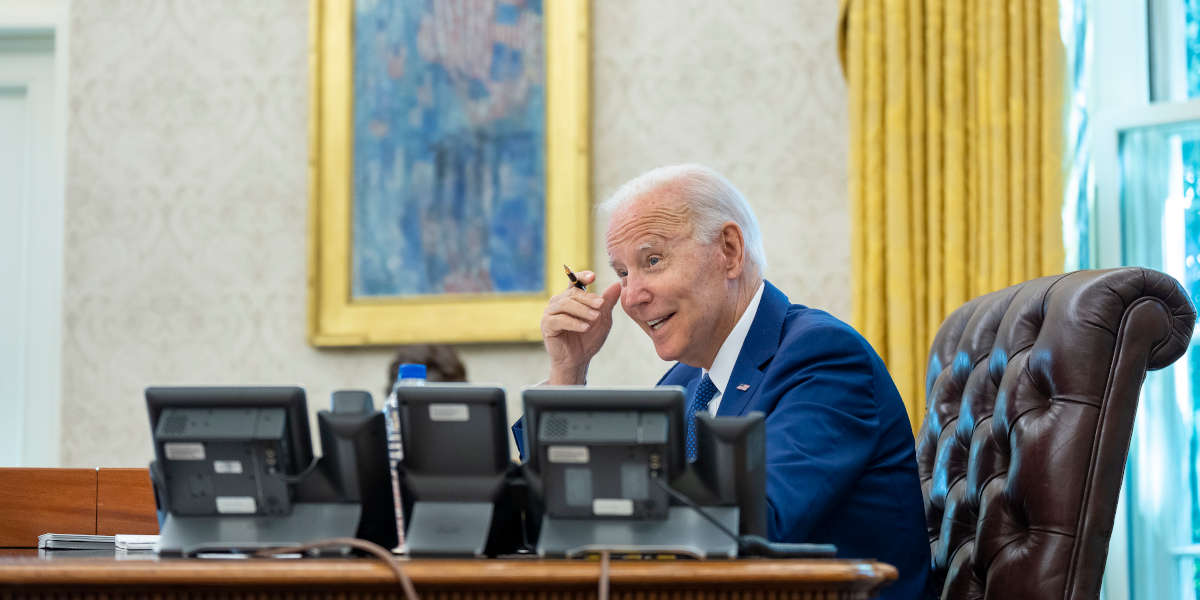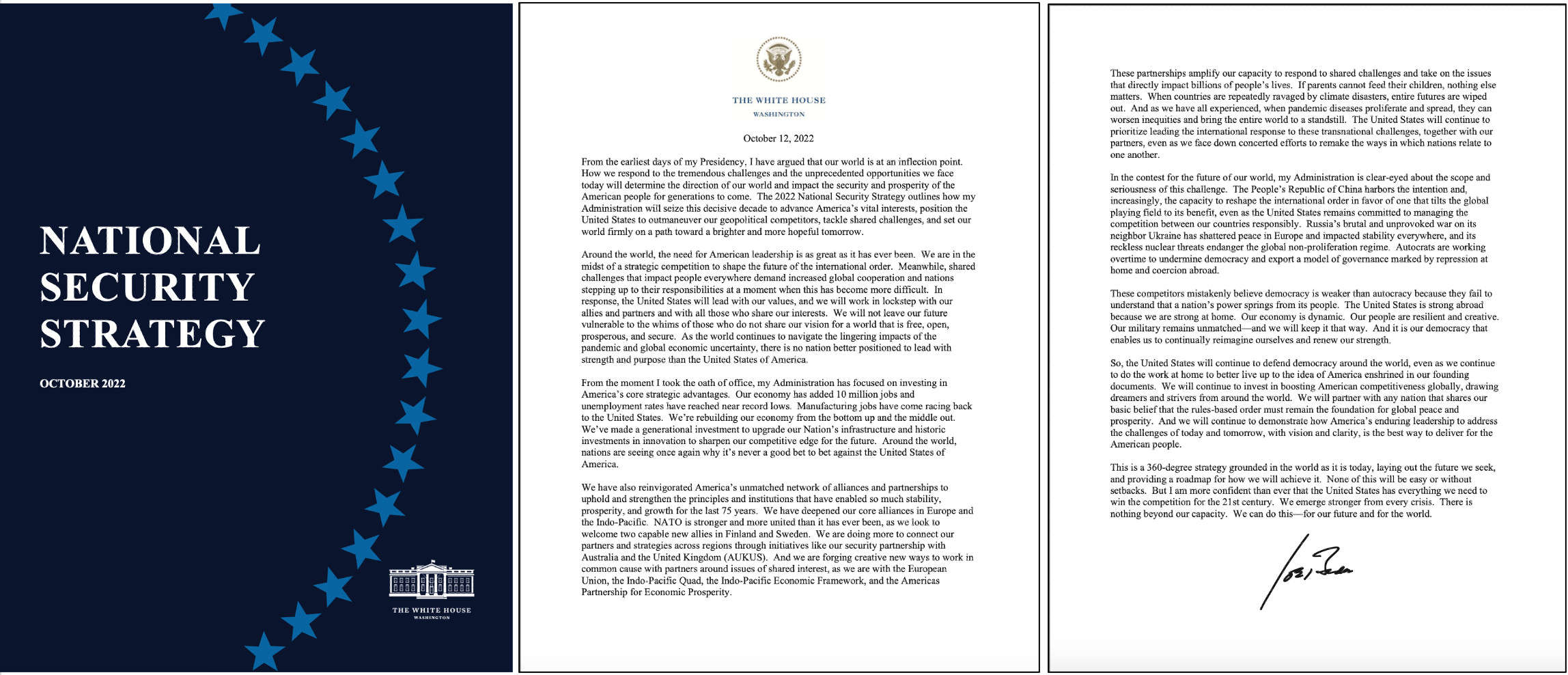This binomial of threats is completed with the definition of a multiplicity of varied risks that mix climate change and energy security with pandemics, food security, the proliferation of weapons of mass destruction and the once so worrisome transnational terrorism, which appears so faint in this NSS. All of them are defined as global threats -no longer specific to the United States-, and are united by the common thread of the need to tackle them jointly and cooperatively; an interesting 'desideratum' that seems incompatible with the confrontational stance advocated with China and Russia, whose cooperation -especially that of Beijing- is essential to make significant progress on these risks.
As is logical, this strategic document is not very specific, neither in terms of the resources that the United States plans to invest in counteracting or mitigating the threats and risks defined, nor in the methods it will follow to do so. The details it provides are, however, sufficiently eloquent and move along three axes: strengthening the domestic front to ensure the country's international competitiveness; employing diplomacy to act multilaterally whenever possible and compatible with US interests; and modernizing and reinforcing the nation's military power.
The first of these axes is particularly striking for its confirmation of the indissoluble unity between a country's foreign security and its domestic stability and strength, and for its recognition of the risks and the direct impact that the serious polarization of American domestic political life and its lack of investment in areas such as infrastructure, Education, or emigration have on national security and on the nation's foreign strength. No country -not even the United States- can aspire to achieve important objectives on the international scene if it does not first build on the solid instructions of a project shared by all, of a strong Economics and of a vibrant and united society. As Richard Haass said in his 2014 book, "foreign policy begins at home." By way of grade aside, and from a purely Spanish point of view, it would not hurt to heed the dictum of this maxim.
Regarding the second axis, since the beginning of his mandate, President Biden has already expressed his firm intention to use diplomacy as a preferential tool in his International Office, capitalizing in his favor the dense network of allies, partners and friends that the United States has perseveringly woven for decades. Now, by concretizing it in the NSS, the US administration makes clear its willingness to approach even dubiously democratic or even non-democratic regimes ("we will deepen our cooperation with democracies and other like-minded regimes") when it suits the promotion of US security objectives. This means adopting a pragmatic stance seasoned with political realism that departs from the idealism traditionally associated with Democratic Party governments according to which only approaching regimes seen as legitimate -that is, democratic- is ethically acceptable.
As for the use of the nation's military power -the third axis of action in the NSS-, Biden is sample, without nuance, willing to employ it to defend national interests, but clarifying that he will do so by using it as an element of last resource, with clearly defined and achievable objectives and missions, of agreement with the nation's values and laws, in combination with other elements of national power, and with the informed consent of the American people. These qualifications, so reminiscent of the Powell-Weinberger doctrine of the 1980s, cannot but be seen as a preemption taken with the long interventions in Iraq and Afghanistan in mind and, of course, in opposition to them.
The last part of the NSS takes a geographical tour of different regions of the globe. The security interests of the United States are at stake in all of them, and a strategic posture is defined for all of them. As might be expected, the Indo-Pacific region appears to be the focus of America's attention, which is consistent with the role of the main threat that the United States attributes to China in the NSS. Despite the fact that the focus of American attention has shifted to the Asian continent, from a purely continental perspective it is worth asking where Europe stands in this new NSS and what it implies for Europeans.
Beyond noting the relative loss of Europe's weight in American security calculations, the NSS, at least at the declaratory level, continues to see the transatlantic link as a vital relationship, and continues to define it in terms of values, history, and common interests. The article 5 of the Washington Treaty, to which Biden declares himself in the NSS to be "unequivocally" attached, continues to stand as the main beam that inextricably binds Europe to North America. Conjured, at least apparently, the danger that gravitated over the Atlantic Alliance during the Trump era - thanks, yes, to the personality of the new president but, also and above all, thanks to the reinvigoration that a 'brain-dead' NATO has undergone as a consequence of the invasion of Ukraine - the United States returns to Europe, although it does so without losing sight of Asia, and insisting on the need and urgency for the allies to show greater involvement in their own protection, which would translate into an increase of expense in defense that would allow the Europeans to assume greater responsibilities, and the Americans to concentrate more resources in the Indo-Pacific.
Apart from obvious changes in form, the desire for a greater European commitment to its own security differs little from the demands that Trump - and, let us not forget, not a few of his predecessors - made of their transatlantic partners, and is not confined to the European space alone; Aware that the magnitude of the Chinese challenge is global in today's interconnected world, Biden urges Europeans to "play an active role in the Indo-Pacific, including supporting freedom of navigation and peace and stability across the Taiwan Strait." The idea behind this statement is that China is not a matter for the United States alone, but for all who participate in and benefit from the bounties of global markets. Getting involved "is not a favor to the United States. Our allies recognize that the collapse of the international order in one region of the world will ultimately affect others." Although timidly, some of the European countries have in fact begun to wake up to this reality by increasing their military presence, both temporary and permanent, in this strategic region, or by getting involved in projects such as AUKUS.
Veiled references to Trump and the 'neo-con' policies of the past abound throughout this new National Security Strategy. One gets the feeling, at times, that Biden's security team has made a deliberate effort to show the international community - reassuringly, one might add - what a return to orthodoxy Biden has in International Office that his predecessor would have so abruptly abandoned. This, however, does not seem to prevent him from incorporating into the NSS some ideas that seem to be taken directly from 'Trumpism', such as adopting a more assertive stance towards China, the aforementioned pointing out to the Europeans their low level of commitment to their own security, or denouncing how the free trade agreements signed by the United States have been abused by other actors to the detriment of American interests.
In conclusion, this is an NSS that seeks to bridge the gap that Donald Trump's administration would have supposedly opened on what, until then, would have been a quasi-interrupted history of strategic formulation based on the inevitability of American leadership, on the predictability of its practical effects, and on multilateralism as the preferred response to security challenges. sample The US is, moreover, a country refractory to the idea that it is witnessing its decline -something that is by no means proven-, determined to show that it is back on the international scene, and which aspires to reinforce its position as the preeminent power in a world at the crossroads. A strategy, on final, coherent and aligned with the purpose that President Biden expressed in February 2021 before the department of State when he announced to the world his message, "America is back. America is back.


